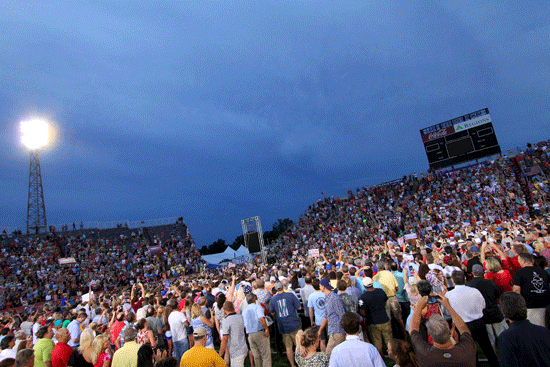

COLUMBUS, Ohio: While thousands streamed into a football stadium Friday evening in Mobile, Alabama to see Donald Trump, a much smaller crowd of committed conservatives unwound at a bar and mused over the good, the bad and the unknown of the unlikely Republican presidential front-runner.
They were volunteers and staff for Americans for Prosperity, a non-profit group funded by industrialist billionaire brothers Charles and David Koch, two of the most effective conservative activists in US politics.
Some 3,600 people came to this year’s annual Defending the American Dream Summit from around the country on Friday and Saturday, taking in appearances by a handful of the 17 Republican presidential candidates. Trump was not invited.
On the national level, Trump is dominating the contest for the 2016 Republican presidential nomination and widened his lead over the crowded field in a Reuters/Ipsos poll on Friday, with 32 percent of those surveyed saying they backed the billionaire.
But among this self-selected group of politically engaged conservatives, his popularity has yet to solidify. Trump the phenom dazzles, but Trump the candidate is getting the same scrutiny as the other 16 Republicans.
The apparent reticence among this influential grouping plays into one of the big political questions of the moment: Can Trump turn his strength in the polls and undeniable attractiveness to a slice of voters into victories in Republican primary elections early next year?
In the mid-term 2014 elections, AFP achieved a 95 percent success rate in the election races where it spent money. As a non-profit, it cannot advocate for specific candidates, but it runs ads to defeat candidates who it believes are not doing a good job on specific issues. AFP President Tim Phillips told Reuters on Saturday the group would keep its “laser” focus on advocating for issues like tax reform, repealing the Affordable Care Act and fighting environmental regulations, no matter who is elected.
Former Florida Governor Jeb Bush, Texas Senator Ted Cruz, Louisiana governor Bobby Jindal, former Texas Governor Rick Perry, and Florida Senator Marco Rubio were among the scheduled speakers. When it came to choosing candidates to invite to the summit, Phillips said “We talked to people who had records that for the most part were philosophically aligned with us.”
“We didn’t want a cattle call,” he added, while noting that Trump had appeared at past AFP events. AFP officials don’t mince words about politicians they dislike and Phillips recalled how AFP was critical of Cruz during the government shutdown two years ago.
Reuters




